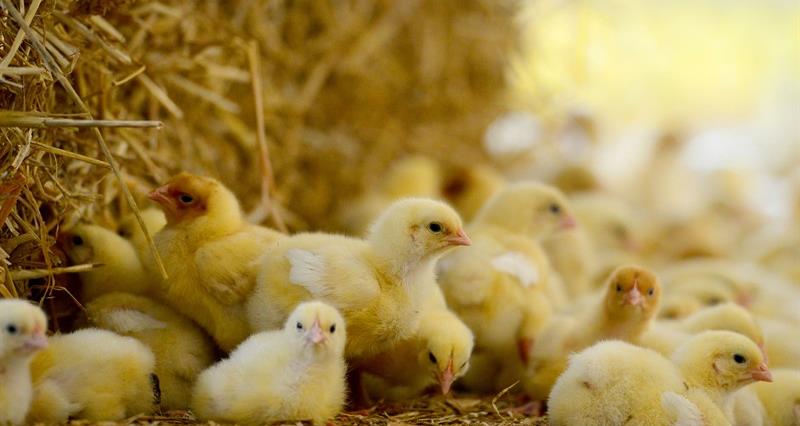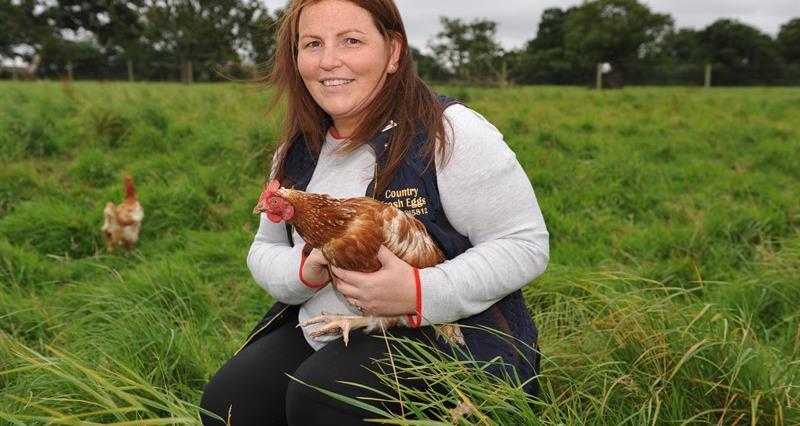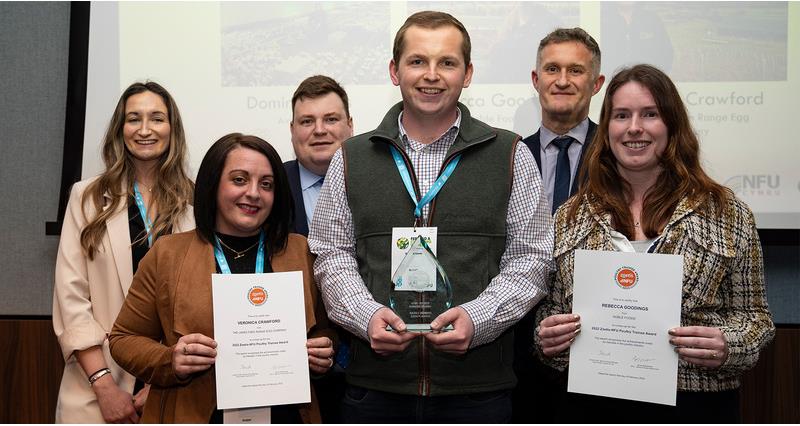How much do our high welfare standards actually benefit the birds themselves?
I was particularly interested in the session discussing perceived welfare benefits versus measurable welfare benefits.
There has been little research on how some of the current welfare criteria stipulated by customers and retailers actually improve bird welfare.
Are you interested in taking part in the next Zoetis-NFU Poultry Trainee Award? Entries for the 2023 award are opening soon. You can find more details at the bottom of this article.
New approaches to improving welfare standards
We visited the ILVO research institute that is part of Ghent University where we learned about trial work to provide a better understanding of broiler welfare. Trials included the impact of various perches, raised platforms, different coloured lights and sounds on broilers using cameras, microphones and microchips to track their location.
The ILVO is researching these areas to develop a set of standards that welfare outcomes can be measured against so that decisions are based on measurable benefits as opposed to perceived benefits.
Many of the welfare standards introduced for the UK poultry industry come from the retailers and/or auditing bodies. They set the standards and if you supply them, then those standards must be adhered to.
Most are based around improving welfare – obviously a good thing to do – as we should be striving to achieve high welfare standards and the UK has some of the highest across the world. However, these standards can sometimes be used more as a marketing tool to persuade consumers to choose their product.
In the UK, most broiler chickens are grown to the Red Tractor standard, and in addition many supermarkets and food suppliers have their own set of standards, and even have different tiered standards depending on the target consumer.
Generally, the higher the standard the higher the cost, because ultimately it costs more to produce. However, as supermarkets try to remain competitive, these higher costs are not always passed on to shoppers.
How welfare standards vary across the globe
Consumer perception of welfare varies depending on many different factors such as country, culture and the individual. What might be deemed as good welfare in one country could be seen differently in another, as we tend to become accustomed to what is acceptable in our own country.
For example, in the UK we have humanised many animals. In many third world countries animals are seen purely as a protein source to survive, and this view may be driven by food scarcity and poverty. Hence, welfare standards have developed rather differently across the world.
In the Netherlands for example, the majority of broilers are now reared as slow growing. However, in Brazil broilers are grown to a higher stocking density and there is very little slow grown chicken.
As part of the Red Tractor standards for broiler production in the UK, chickens have access to natural daylight, perches, pecking objects and enrichment bales with a maximum stocking density of 38kg/m2. These enrichment standards do not exist for standard broiler production in many countries, and broilers are also grown to 42kg/m2. In fact, the UK is one of the few countries to make access to natural light a basic broiler growing standard.
So ultimately as a broiler producer we grow to what the consumer wants – or what the retailer thinks the consumer wants – and this is right considering the consumer is paying for the product. However, we must make sure that any new standards are going to have a positive welfare impact on the birds.Not just because our perception is that they may like it.
Broiler growing standards are rapidly changing as the poultry industry adapts to the ever-changing markets. Now it is more important than ever to be able to measure these welfare standards and ensure that we are improving the lives of these animals.
Bringing sustainability into the equation
Across the world there are growing concerns about the impact we are having on the planet through global warming, and we know we need to reduce our carbon footprint to slow down climate change.
This is where welfare and sustainability can hit a crossroads, such as with the slower growing broiler that are grown to a maximum stocking density of 30kg/m2.
These production systems have a lower stocking density and do improve bird welfare through less pressure and competition for feed, water and space. However, by rearing fewer birds in the same amount of shed space the carbon footprint is increased.
Sometimes improving one aspect of welfare is detrimental to another. Free-range production allows birds to roam outside (which is perceived to be better welfare) but they are more likely to contract disease such as avian influenza and are at risk from predators, whereas barn reared chickens are kept inside but are free from risk of predation and biosecurity can be much better controlled. So, which is better?
I think we all agree that we want to strive for the highest welfare standards, but without a specific way of measuring the outcomes, it is difficult to know what is best for the birds.
I hope to share what I have learned during this course with people involved in the poultry industry, and this knowledge will help my role in striving for the highest welfare standards.
I am very grateful to Zoetis and the NFU for this opportunity, and recommend others involved in the poultry industry to apply for the award this year!
Entries for 2023 award opening soon
The 2023 Zoetis-NFU Poultry Trainee Award will open for entries in the autumn. Since the award was instigated by Zoetis in 2007, it has been won by employees in all sectors of the poultry meat and egg industry.
“Through the years it has been a great pleasure to see the wealth of talent and enthusiasm among entrants,” said James Porritt, Zoetis national pig and poultry sales manager.
“The prospects that the poultry industry provides for lifelong careers need to be more widely recognised and the award helps to promote these opportunities”
Winners have used the grant for training, and as a travel scholarship – and to help progress their careers. The entry form will be available in early autumn, with the deadline November 30.
The judging panel from Zoetis and the NFU will select three finalists for interview over Zoom in December. The finalists will be featured in the January/February edition of NFU Poultry.
The winner receives a trophy and a £1,000 training grant sponsored by Zoetis. All finalists will be invited to the Egg & Poultry Industry Conference at Celtic Manor Hotel, Newport, in November 2024.
More from NFUonline:




